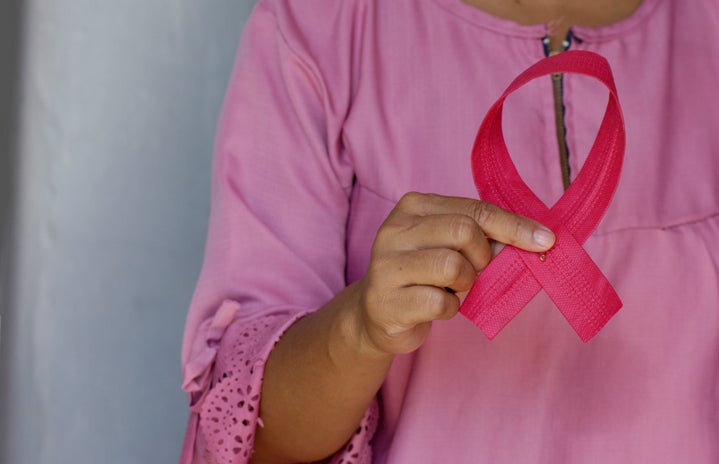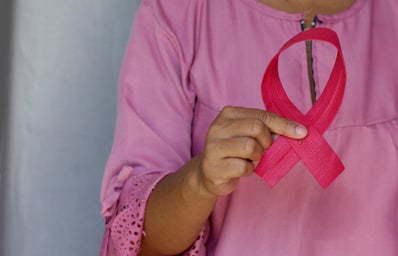Besides Halloween, October is also known by the “Pink October Campaign”, which promotes breast cancer awareness and alert women about the risks and precautions of it. According to the World Cancer Research Fund (WCRF), breast cancer is the second most common type of cancer in the world and it affected over 2 million people in 2018.
It is not easy to go through cancer treatment since the procedure not only causes many reactions, but it can also affect a lot of people’s mental health, as any other intense disease treatment. With the coronavirus pandemic, this tension has grown higher for some and has been indifferent to others. Considering that, Her Campus Cásper Líbero talked with some brave women that are going or went through breast cancer treatment during the pandemic to see how the current world situation has affected the process.
- Tatiana
-
Tatiana Correia Santana, 37, is a hairdresser specialized in brides, that owns her salon. She discovered a lump in her breast in December of 2019 by doing a self-exam, just like the ones taught in the Pink October Campaign, and decided to look for a doctor to investigate it. In January of 2020, she was diagnosed with breast cancer and started her treatment, which included chemotherapy and radiotherapy sessions and a mastectomy (a surgery to remove the whole breast).
She already ended her chemotherapy sessions and successfully did the surgery, both during the coronavirus pandemic. Tatiana says that social isolation hindered her healing process. First, she had to stop working, which used to help her to distract herself from the disease. Therefore, she says a “5 months treatment felt like 10 years”. It was also prohibited for her to bring a companion to the chemotherapy sessions, which also had a huge impact on her emotional wellbeing since, according to her, “having my friend by my side made those hard moments lighter”. She also highlights the psychological impacts that the pandemic had on her, during a time she was already weakened due to the cancer treatment: “I felt really scared since my immunity was lower because of the procedures and still had to go out to my sessions every week, so I thought that if I got the coronavirus I would definitely die”. Tatiana explains that she also felt sadness during this period because she had to shut down her salon and could no longer receive the love and support from friends and family; “I was scared I would die without seeing again those I love”.
She points out the two things that helped her to feel emotionally better in the circumstances she found herself in: first, an online treatment with a therapist; and second, to help people, which she would do through her Instagram account. In her profile, Tatiana would share the whole process she was going through and her experiences with it. “ As I started posting, other women going through the cancer treatment came to me asking for tips and telling they had mirrored themselves in me; and that was what made me stronger, to be able to help people”, she says.
Tatiana leaves as a piece of advice for women who have recently discovered cancer the phrase: “you can do it!”. She completes by saying “it is not going to be easy, there will be hard days that look like an eternity, but they will pass”. She also alerts people to not hide their disease from the world because we usually are stronger than we believe.
- Anna Karina
-
Anna Karina Tamura de Oliveira Gomes, 45, is a physiotherapist who discovered a lump in her breast while doing a self-exam video for the Pink October Campaign. She decided to go to a doctor, and in December of 2019, she started the breast cancer treatment. Just like Tatiana, she did chemotherapy and radiotherapy sessions, but it was not necessary for her to do the mastectomy, only a surgery to remove the tumor. She highlights that it was of extreme importance to continue the treatment during the coronavirus pandemic because stopping it in the middle could compromise the positive results she had achieved so far.
Anna explains that, even though these serious diseases carry with them a huge emotional bourdon, she was able to handle the process with positive energy, and explains she was familiarized with the process because people in her family went through it too. She says that differently from the rest of the world, she did not panic with the social isolation; she just kept her mind on getting better and on what she could do to achieve that. “The pandemic itself did not interfere in my treatment, life, or emotional wellbeing; I continued working online, and the pandemic actually helped me in that point because I had more time to take care of myself since I had more free time”.
She points out that what helped her to get through this period was “to not stop living”. “I kept teaching (online) pilates classes, continued doing sports as far as it was possible in my conditions (…) I love to study and could catch up about techniques in my job”. Anna adds that having the support her loved ones, especially her husband, was also essential; “I already knew he was an extraordinary person (…) and I had his support 100% of the times, he did not abandon me at any time, and that made me feel safe”, she explains.
Anna advises women that are going through cancer treatment to accept what they are passing because the acceptance makes the whole process more positive. “Be grateful for the lessons you will have during the treatment (…) because when you accept it and are open to things, the hard days will not look so hard anymore.”
- Dolores
-
Dolores Delegá was 78 years old and already retired when she found out about her breast cancer. At the end of 2019 she discovered a lump in her breast and went to a doctor, but it was diagnosed as a benign tumor. Unfortunately, it continued to grow though, and in May of 2020, after many exams, she found out she had cancer. She received the same treatment plan as Tatiana and Anna but has not finished her chemotherapy sessions yet.
She explains that, in her case, the coronavirus pandemic really interfered with the treatment. To start with the diagnosis, that took too long to happen since, at the beginning of isolation, older people were not allowed to do exams and appointments at doctors or hospitals, unless it was an extremely risky case. Therefore, the tumor grew too much, and it made the process harder; “I wanted to be treated but I couldn’t ”, she says. It also affected her emotional because, besides the psychological bourdon that the disease brings, she also had to deal with the social isolation being an outgoing person. “The isolation makes it a recluse life and it just makes the anxiety of going through that process grow”.
Dolores highlights that the love and support of her family, especially her husband, to whom she has been married for almost 60 years now, were the things that helped her during the treatments. “The exams are really hard, the chemotherapy itself is pretty aggressive, and the only thing I had to keep me going was my family and the hope to get better soon”, she explains.
At last, she leaves a piece of advice for the women who are going through this kind of treatment: “You have to keep yourself calm and do not be afraid to confront reality. You must be perseverant otherwise it will only be harder.”
————————————————————————————————————–
The article above was edited by Gabriela Girardi
Liked this type of content? Check Her Campus Cásper Líbero Home Page for more!


